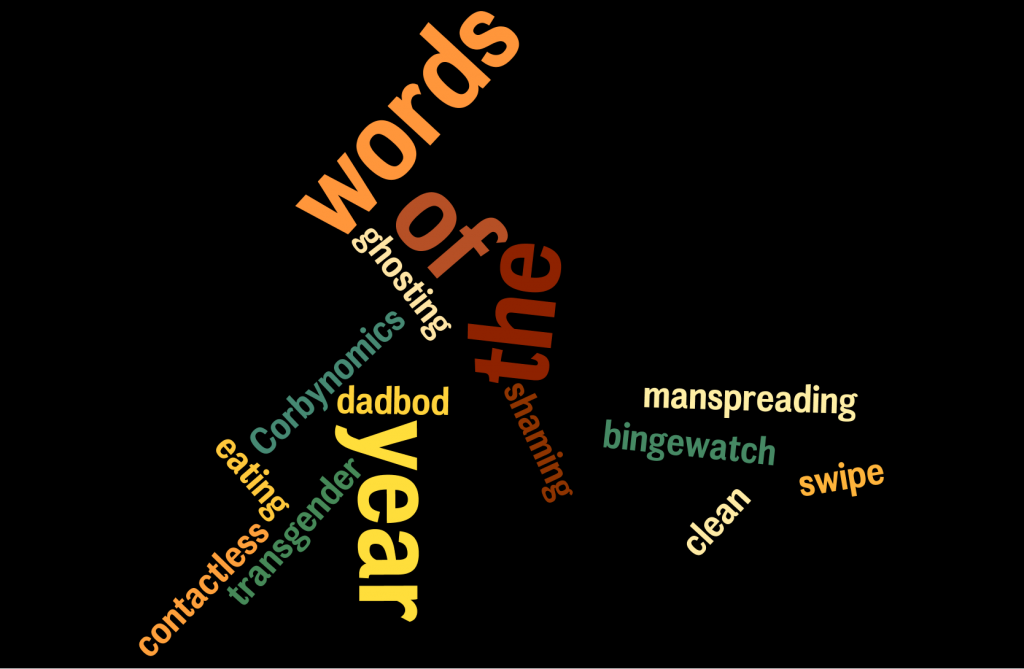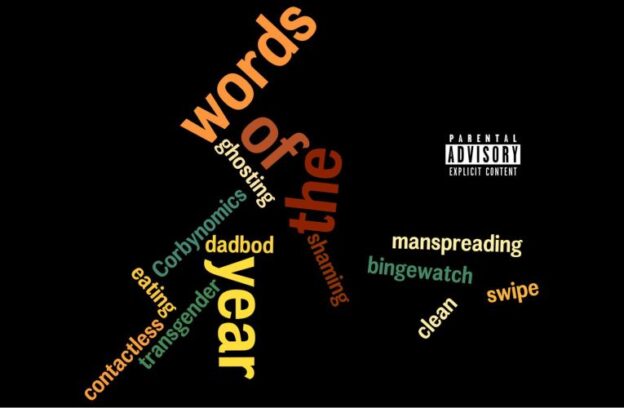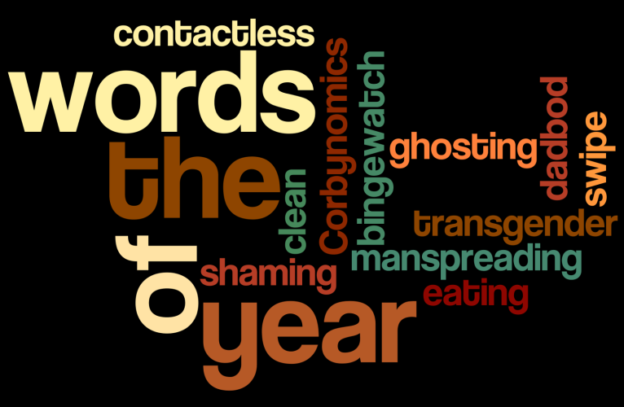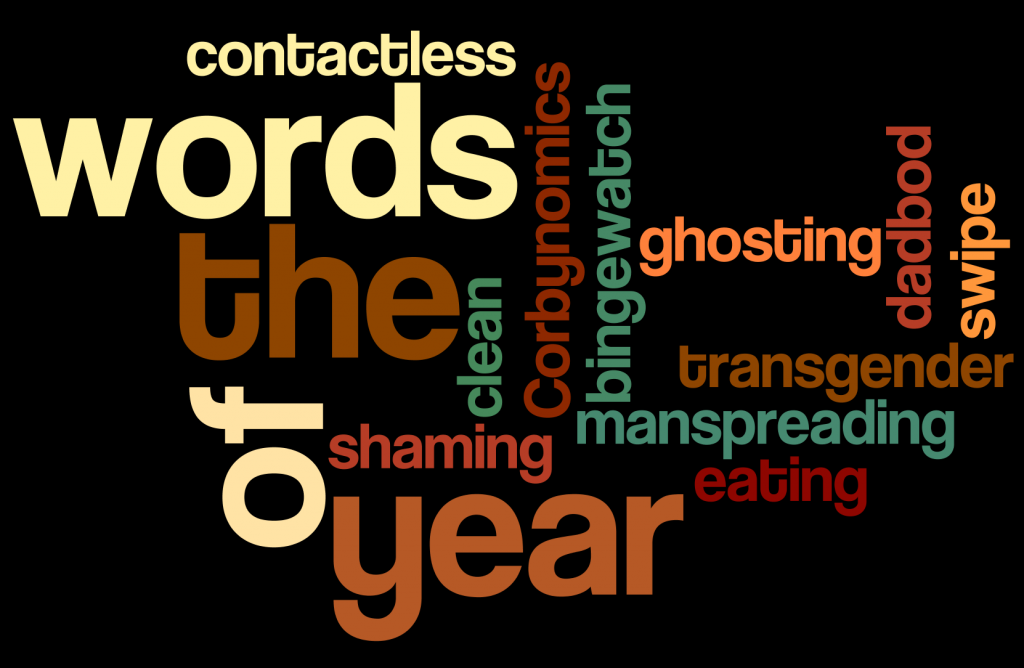Welcome to part two of this series about the Collins Dictionary Words of the year 2015. In this episode you’ll hear me discuss these words with Amber and Paul. I’ll also explain and clarify a lot of the things you’ll hear in our conversation. You can listen to the episode, download and also read vocabulary notes below.
![]() [DOWNLOAD]
[DOWNLOAD]
***This episode contains some rude language and explicit content.***
Recently I had Amber and Paul over to the flat and we talked about this list of new words that Collins are introducing into their online dictionary this year. These are all new words we’ve been using a lot this year. Collins have judged them to be worthy of recording in the dictionary. They all relate to new trends in our culture over the last year.
In this series I’m playing you chunks of the conversation with Amber and Paul, and then pausing that and clarifying some of the grammar, vocabulary and pronunciation that you heard.
So, you’re getting to hear some natural conversation, but also you’re getting some intensive language teaching too. Hopefully this is the best of both worlds for you as a listener.
Now, without any further ado, let’s carry on. Let me now play you the next conversation chunk. Here it is – this is word 10 in the list of 10 words. Here we go…
Word 10 – “transgender”
transgender (adjective): of or relating to a person whose gender identity does not fully correspond to the sex assigned to them at birth
He’s transgender.
She’s transgender.
Transgender issues.
He was held up as a great example of an American athlete. (to be held up as something)
He identified as female. (to identify as – this is the expression used to say that someone feels like they have a particular identity, particularly in relation to ethnicity, gender etc – e.g. the case of Rachel Dolezal, who worked as a civil rights leader in Washington. She was criticised in the media (shamed) for lying about her ethnicity – she basically tried to pass herself off as black while campaigning for equal rights issues – but she was actually white. Even her parents were in the media saying “yeah, she’s caucasian”. Pretty weird thing to do, and lots of people got angry saying “you can’t just say you’re black and pretend to be a victim of discrimination, when you’re blatantly white!” When criticised for this, she just said “I identify as black” – not “I am black”. This was also a trending story this year. http://www.buzzfeed.com/claudiakoerner/a-civil-rights-leader-has-disguised-herself-as-black-for-yea#.tiM247b0q
Transvestism / Transvestite (a transvestite is different to a transgender person. Transgender = a man who identifies as a woman even though physically he’s a man – or the other way around, and a transvestite is a person who enjoys dressing as a member of the opposite sex, for whatever reason – usually this is a man who likes dressing as a woman. For some reason this is far more shocking than a woman dressing in male clothes, which nobody seems bothered about)
3 positions (basically): 1. It’s a good thing 2. It’s a bad thing 3. I don’t really care either way.
She’s old school (Germaine Greer). She’s an old school feminist. (old fashioned)
Her position about what feminism should be and how we should address it was important but it has changed and I think she’s not changed with it.
(I talk over Paul quite a lot when he’s talking about same-sex marriage – sorry Paul)
Cisgender (adj)
To misgender someone (not some sort of transgender competition, it’s a verb which means ‘to wrongly gender someone’)
Mx (Mr, Mrs, Miss, Ms and now Mx)
Word 9 – “to swipe” (there’s some rude language and rude content here)
swipe (verb): to move a finger across a touchscreen on a mobile phone in order to approve (swipe right) or dismiss (swipe left) an image
Swipe was already a word, but this is the specific use of ’swipe right or swipe left’ to mean “accept or reject someone on a dating app”.
Tinder (app)
“Tinder” (“TINder??” pronunciation with surprise and disdain)
to sign up
The unwritten rule
To make a match
I will “do” anything (“do” here means “have sex with”)
Naughty pictures.
Dick-pics
Tit-pic?
‘Pussy’-pic?
Don’t go there.
You’re going there.
He’s dipping his toe in.
He’s taken pictures of his phallus. (other words for a penis. Medical/clinical words: penis, phallus. Informal but not rude: willy. Suggestive but not swear words: tadger, member, private part(s). Rude words: prick, cock, dick.)
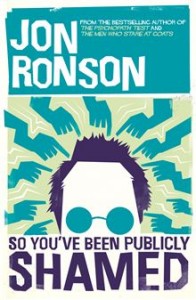
Word 8 – “shaming”
shaming (noun): attempting to embarrass a person or group by drawing attention to their perceived offence, especially on social media
To be publicly shamed
She was trying to be funny by awkwardly implying that it’s very unfair.
There is this massive problem in Africa, and it’s less of a problem in Europe.
If you put that on Twitter the chances are people are going to misunderstand and they’re going to have a knee-jerk reaction, and they will respond in a very angry way.
An Über driver got beaten up by an executive of Taco Bell.
He was completely wasted and completely off his face.
He was slurring his words (remember that one?)
There’s something un-just about it.
You’re making a judgement call on the way someone looks, or what someone does.
You know there was that whole thing about slut shaming.
Book recommendation: Jon Ronson “So You’ve Been Publicly Shamed” www.audibletrial.com/teacherluke
His voice is a bit off-putting at the beginning but he really draws you into the story.
[socialpoll id=”2310152″]
End of Part 2
